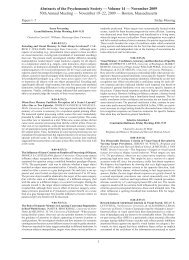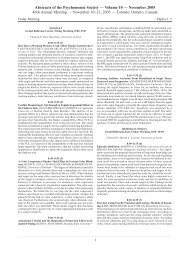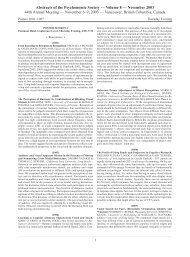S1 (FriAM 1-65) - The Psychonomic Society
S1 (FriAM 1-65) - The Psychonomic Society
S1 (FriAM 1-65) - The Psychonomic Society
You also want an ePaper? Increase the reach of your titles
YUMPU automatically turns print PDFs into web optimized ePapers that Google loves.
Saturday Evening Posters 5048–5055<br />
findings that depend on specifics of the standard classification<br />
paradigm.<br />
(5048)<br />
Classification Versus Inference Tasks: Why Do <strong>The</strong>y Lead to Differences<br />
in Category Representation and Use? BENJAMIN JEE,<br />
University of Illinois, Chicago (sponsored by Susan R. Goldman)—<br />
Category learning research has contrasted two tasks: classification<br />
learning (CL) and inference learning (IL). In their review of this literature,<br />
Markman and Ross (2003) concluded that IL leads to prototype<br />
representations, whereas CL leads to representations around diagnostic<br />
features. This study explored why this is the case, and how<br />
these differences affect knowledge use. Participants learned about a<br />
new category through a CL or IL task. To tease apart the attentional<br />
and processing demands of these tasks, a restricted-inference learning<br />
(RIL) condition was included, in which participants performed an<br />
IL task involving only diagnostic features. <strong>The</strong> results showed that in<br />
terms of both category representation and use, performance in the RIL<br />
condition was more similar to CL than IL. Thus, differences in representation<br />
between IL and CL tasks may be due to the ways in which<br />
features are attended and encoded, rather than characteristics inherent<br />
to the learning processes themselves.<br />
(5049)<br />
Conceptual Judgments of Expert Versus Novice Chemistry Students:<br />
An fMRI Study. JAMES K. NELSON, Dartmouth College,<br />
RAPHAEL A. LIZCANO, Harvard University, LESLIE J. ATKINS,<br />
Lesson Lab Research Institute, & KEVIN N. DUNBAR, University of<br />
Toronto—Using fMRI, advanced chemistry and nonchemistry students<br />
were imaged while judging representations of molecules before<br />
and after a phase change (liquid to gas). Chemistry experts show relatively<br />
high levels of left inferior frontal activity on this task compared<br />
to novices, whereas novices show relatively high levels of inferior<br />
temporal and occipital activity compared to experts. This pattern<br />
of results is consistent with chemistry novices treating the task as a<br />
form of perceptual classification, whereas chemistry experts treat the<br />
task as a form of semantic/conceptual classification. Comparisons between<br />
this and an earlier fMRI study using a Newtonian mechanics<br />
task have implications for domain-specific differences in conceptual<br />
change in chemistry and physics education.<br />
(5050)<br />
Stereotype Threat Depends on Task Reward Structure and Task<br />
Type. LISA R. GRIMM, ARTHUR B. MARKMAN, W. TODD<br />
MADDOX, & GRANT C. BALDWIN, University of Texas, Austin—<br />
Research documents performance decrements in tasks resulting from<br />
the activation of negative task-relevant stereotypes. We suggest these<br />
negative stereotypes produce a prevention focus (i.e., a sensitivity to<br />
losses) that mismatches the positive feedback typically given in tasks.<br />
Performance usually suffers because this mismatch creates lower levels<br />
of flexibility than are observed in people who do not have this negative<br />
stereotype. To test this possibility, we induced a positive or a<br />
negative stereotype in participants and then gave them a complex classification<br />
task in which they either gained points or lost points. Individuals<br />
with a negative stereotype performed much better in this task<br />
when they lost points than when they gained points. In contrast, those<br />
with a positive stereotype performed better when they gained points<br />
than when they lost points. This pattern reversed when participants<br />
were given an information integration task for which cognitive flexibility<br />
is disadvantageous.<br />
(5051)<br />
Domain-Specific Inquiry Strategies. LINDSAY BLAU PORTNOY<br />
& MITCHELL RABINOWITZ, Fordham University (sponsored by<br />
Mitchell Rabinowitz)—Prior research shows that people distinguish<br />
cognitively between different categories—for example, animate and<br />
inanimate, causal and noncausal, and human and nonhuman. <strong>The</strong><br />
present research investigates whether people use different patterns of<br />
130<br />
inquiry for different domains. We investigated this by asking people<br />
to generate questions about the content areas of history and biology.<br />
Seven categories of questions were identified: requests for information,<br />
questions about function, inquiries about why, questions about<br />
features, possibility statements or questions, mechanism questions,<br />
and requests for further information. Students’ questions were sorted<br />
into these categories to discern patterns of inquiry. For biology, students<br />
tended to ask questions regarding function and possibilities,<br />
whereas in history, students tended to ask questions requesting additional<br />
information. <strong>The</strong>se results indicate that people approach different<br />
knowledge domains with different inquiry strategies.<br />
(5052)<br />
<strong>The</strong> Influence of Causal Information on Treatment Choice. JEN-<br />
NELLE E. YOPCHICK & NANCY S. KIM, Northeastern University—<br />
Knowledge of the causal structure of a category has been shown to influence<br />
categorization (e.g., Ahn, 1998; Rehder, 2003) and diagnostic<br />
reasoning (Kim & Ahn, 2002; Kim & Keil, 2003). In two studies, we<br />
examined whether causal information presented in a causal chain (X<br />
causes Y which causes Z) affects treatment choice for mental disorders.<br />
For Study 1, artificial disorders were created using symptoms<br />
from the DSM-IV-TR (APA, 2000). <strong>The</strong>se had either a biological root<br />
cause and psychological intermediate cause, or a psychological root<br />
cause and biological intermediate cause. Lay participants were asked<br />
to rate which of two fictitious treatments, a drug or a psychotherapy,<br />
would be more effective in treating each disorder. People reliably<br />
chose to map treatment choice onto the root cause of the mental disorder.<br />
Study 2 replicated this result using blank properties as symptoms.<br />
Possible implications for theory-based categorization and clinical<br />
practice are discussed.<br />
• CONCEPTS •<br />
(5053)<br />
Spatial Processing and Category-Specific Deficits. CHRIS HOPE<br />
& LORI BUCHANAN, University of Windsor—<strong>The</strong>re are a variety of<br />
explanations for the finding that some neurological patients are impaired<br />
at naming pictures of living things while being relatively unimpaired<br />
at naming pictures of nonliving things. Explanations range<br />
from those centered on characteristics of the objects themselves to<br />
those relating distinct naming abilities to evolutionary pressures. A<br />
series of experiments test the claims of several of these explanations.<br />
<strong>The</strong> findings are not entirely compatible with any of the extant theories<br />
but suggest a hybrid explanation that will be described in the<br />
presentation.<br />
(5054)<br />
Questioning the Role of Procedural Learning in Probabilistic Categorization.<br />
MEGAN HEFFERNAN & BEN R. NEWELL, University<br />
of New South Wales—<strong>The</strong> dual system account has dominated research<br />
on how people learn probabilistic categories. One widely used<br />
probabilistic categorization task is the weather prediction task (WPT),<br />
which is claimed to engage the procedural system. Two variables<br />
which are thought to impact on the procedural system differentially<br />
are memory load and delay of feedback. It is claimed that memory<br />
load does not impair the procedural system, whereas delay of feedback<br />
does. We investigated the effect of these two variables on WPT<br />
performance to assess its use as a procedurally mediated task. In three<br />
experiments results were inconsistent with this characterization. In<br />
Experiments 1 and 2, two different concurrent tasks interfered with<br />
performance on the WPT. In Experiment 3, delay of feedback did not<br />
interfere with WPT performance. <strong>The</strong>se findings contradict the popular<br />
view of the WPT as a procedurally mediated task and questions<br />
its use as a demonstration of procedurally mediated learning.<br />
(5055)<br />
Representing Competition Among Relations During Conceptual<br />
Combination. CHRISTINA L. GAGNÉ & THOMAS L. SPALDING,





